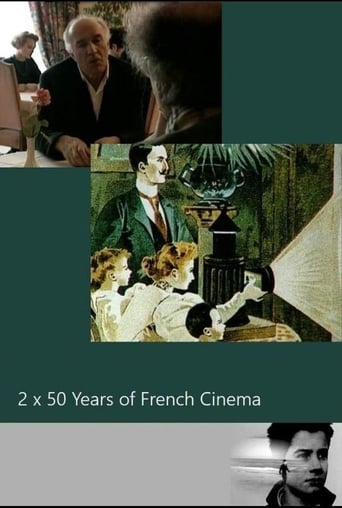Andres Salama
Godard after Weekend has always been very iffy, usually bordering into resentful left wing proclamations and the obscure and the pretentious. But this film, less than an hour long and made as a series of films by the British Film Institute on the occasion of the centenary of the first film (by the Lumiere brothers) is a good effort.Be warned that there are no clips of classic films here - for that you can look at Godard's Histoire(s) du cinema, made at about the same time. We have instead Michel Piccoli, a washed up director (a clear stand in for Godard) in a hotel room questioning the maid about the history of French cinema. Obviously she knows very little about French cinema: when he asks her about Jacques Becker (director of the classic Casque d'Or) among others, she replies that the only Becker she knows is the tennis star Boris Becker. One can guess than in the twenty years since, the ignorance about classic French cinema by the French youth has only gotten worse.Intercalated with the dialogue between Piccoli and the maid, we see intertitles with quotations by famous French critics (Bazin, Langlois, Rohmer, etc). I'm giving a little away the ending if I say that the quote that ends the film is by Truffaut, who had a famous quarrel with Godard in his later years before his untimely death. It's a very moving ending.
rubinek
The documentation begins with a talk between Michel Piccoli and Godard in a small restaurant. Godard isn't comfortable with the 100th birthday of cinema. Why should we celebrate? And why do we celebrate now? Because of the first commercial viewing in France. Yes, there was the bad, bad word: commercial. The small minded pseudo-intellectual discussion is really hard to stand. After complaining about the celebration they go on together complaining about forgotten French directors and actors of the past. They're right, even me, who I believe to be very interested in cinema, don't know much about them. So this is a film about 100 years of French cinema, Godard will surely awake the long forgotten to new life! WRONG. After the discussion we see some scenes with people who work in the hotel (to which the restaurant belongs). They are asked by Piccoli about cinema history. The scenes aren't acted very well. And – we should have known it – the hotel staff knows only violent mainstream cinema like Die Hard and Tarantino movies. Beside this the staff acts like they have an IQ below 40.The scenes are followed by a wild, confusing mix of pictures, scenes and citations without connection or any information about year, names or film titles. Nothing! I've learned not one thing about French cinema after this 52 min. What a waste of time and money.
antoniomt_2000
I can agree with one of the reviewers on this page but I do not agree with the other one.I managed to see this film subtitled and I enjoyed every minute of it. I love the perfect precision Godard has over Piccoli. Evertime Picolli speaks, Godard interrupts and overwrites his information with with a more profound and articulate meaning - thus leaving Piccoli anxious and frustrated, this happens quite often - absolute genius.Also, Its really funny to see the workers (of the place the documentary is set) getting asked about trivial information on the golden age of cinema - they literally don't have a clue. I know this is a reconstruction and you can obviously tell that it is staged but it reconstructs how ignorant some people are, only knowing names like Arnold Schwarzenegger & Madonna and only hearing of films such as Pulp Fiction (because of its mainstream violence) and 9 1/2 Weeks (because of it's mainstream nudity) and how these films are publicised just because of their so-called content. This Documentary also tries to rule out the forgotten french cinema (golden-age that is) and it's true - Godard's part in the first 1/3 is worth seeing alone.but overall, this was very interesting and anybody interested in french cinema (or cinema in general) should try and see this.
frankgaipa
Setting up the intermittent clip show that, even without Godard's typical punctuation, would be worth the price of admission, is his interview with Michel Piccoli. Piccoli was head of (I'm sorry. I forget. Call it the film guild). Over Godard's shoulder we watch Piccoli, double-take, writhe, stammer at Godard's perfectly timed barrage of puns, innuendo, and insight.The couple of times I've seen Godard in person, once or twice in the PFA's now closed Durant Ave. screening room with Jean-Pierre Gorin, and once in UC Berkeley's Wheeler Auditorium with Anna Karina and a male actor, maybe Sami Frey, for a screening of "Bande á parte," he was more grouch than poet. The Wheeler appearance, after some Q and A about improvisation (Karina insisted there wasn none, that he even choreographed the impromptu dance), deteriorated to shouted exchanges with a couple of persistent feminists. Interviewed for print in the Cahiers, he can be pretty dry as well, though sometimes not.But I've always seen a comedian's timing in the intertitles, whether straight or fractalling off in multiple puns, the on and off music, the very film cuts themselves. Like another farceur, Wells, Godard has shown us himself at the editing table. Who knows how much was scripted, how much forewarning Piccoli may have had, how genuine or how acted his reactions may have been. But Godard's delivery is that of a supreme comedian. It's Godard as Groucho. For all Godard's sampling of American cinema, though there must be things I haven't managed to see, I don't recall seeing Groucho. Maybe it's a case of like poles repelling.

